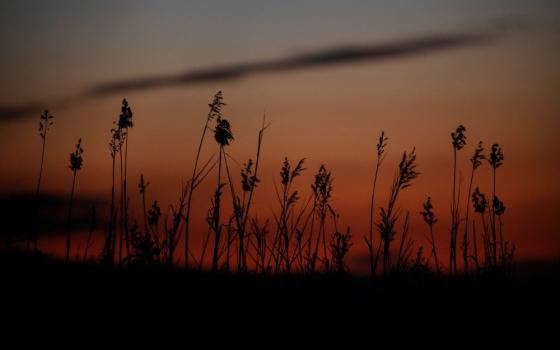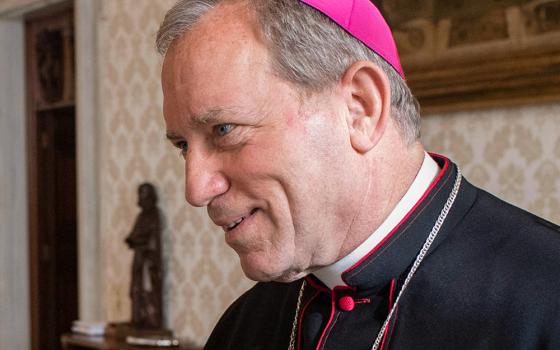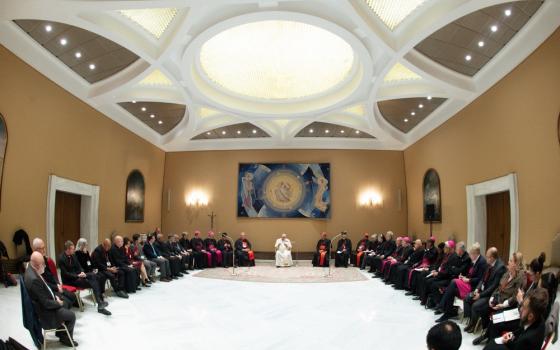Editor's Note: Later this summer, Pope Francis will release his encyclical on the environment and human ecology. The highly anticipated teaching document will be the first from a pope to focus specifically on creation and human relationship with it.
In the two years since his papacy began, Francis -- like his predecessors Popes Benedict XVI and John Paul II -- has spoken regularly on environmental issues, such as protecting creation, climate change, environmental degradation and natural disasters, water, food and sustainability. As part of the lead-up to the papal encyclical, Eco Catholic will revisit key speeches, addresses and messages from Francis on environmental topics.
Oct. 16, 2014, message for World Food Day:

[Graphic: Mick Forgey; CNS photo/Camille Lepage, Reuters]
"How long will we continue to defend systems of production and consumption which exclude most of the world’s population even from the crumbs which fall from the tables of the rich? … There must also be a change in the concept of work, goals and economic activity, food production and environmental protection. This is perhaps the only possibility for building an authentic future of peace.
Again this year, World Food Day echoes the cries of our many brothers and sisters who, in many parts of the world, do not have enough to eat every day. This causes us to reflect on the enormous quantity of food wasted, on the produce destroyed and on price speculation in the name of the god of profit. This is one of the most dramatic paradoxes of our time which we are witnessing helplessly and often with indifference, incapable of feeling compassion at the outcry of other people’s pain, “as though all this were someone else’s responsibility and not our own” (Evangelii Gaudium, n. 54).
Despite the progress that is being made in many countries, recent data continue to indicate a troubling situation, compounded by the general reduction of public development aid. But looking beyond those statistics, one notes an aspect of the problem that has not yet received all due consideration when formulating policies and plans of action: those who suffer due to food insecurity and malnutrition are people, not numbers, and precisely because of their dignity as people, they come before any calculation or economic plan.

… This year dedicated to family agriculture, which is now coming to a close, serves to ascertain once again that the rural family is able to satisfy the demand for food without destroying the resources of Creation. … Indeed, the family promotes dialogue among the different generations and provides the foundation for true social integration, apart from representing that hoped-for synergy between agricultural work and sustainability. Who more than the rural family is concerned with preserving nature for the generations to come? And who more than the rural family has at heart cohesion between people and social groups?
… Never more than at this moment has the world been in need of unity among people and among nations in order to overcome the divisions that exist and the current conflicts, and above all to seek concrete ways out of a crisis that is global, but whose burden falls mostly on the poor. This is demonstrated precisely by food insecurity: although it is true that it interests all countries to a varying degree, it nevertheless affects, first and foremost, the weakest part of the world’s population. Let us consider the men and women, of every age and condition, who are victims of bloody conflicts and of their consequent devastation and misery, including the lack of housing, medical care and education, who lose every hope of a dignified life. We have an obligation towards these people, of solidarity and sharing. These obligations cannot be limited to food distribution which can only be a “technical” remedy, more or less effective, but that terminates when what is set aside for this purpose runs out.
Instead, sharing means to be a neighbour to all human beings, to recognize a common dignity, to understand needs and to sustain them in finding a remedy, with the same spirit of love which is lived in the family. This same love leads us to preserve Creation as the most precious common good on which depends not the abstract future of the planet but the life of the human family to which it has been entrusted. … To defeat hunger, it is not enough to meet the needs of those who are less fortunate or to help through aid and donations those who live in situations of emergency. It is instead necessary to change the paradigm of aid and of development policies, to modify international laws regarding the production and trade of agricultural products, guaranteeing, to countries in which agriculture represents the foundation of the economy and of survival, the self-determination of their own agricultural market.
How long will we continue to defend systems of production and consumption which exclude most of the world’s population even from the crumbs which fall from the tables of the rich? The time has come to think and decide, beginning with each person and community rather than from market trends. Therefore there must also be a change in the concept of work, goals and economic activity, food production and environmental protection. This is perhaps the only possibility for building an authentic future of peace, which today is also threatened by food insecurity."
Want more stories from Eco Catholic? We can send you an email alert once a week with the latest. Just go to this page and follow directions: Email alert sign-up.
















